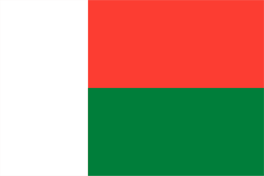 |
République de MadagascarIndependence 26 June 1960
History The 'great island' of the Indian Ocean still holds many mysteries, despite the numerous 'oral traditions' dating to the 19th century and archaeological and historical research that takes us even further back. Its population is definitely composite, though the question of an 'indigenous' people – the mysterious 'Vazimba' – has never been answered. For 3,000 years, the island has received successive and overlapping waves of people from Indonesia, the Near East and the African coast, including Mozambique. In the modern history of Madagascar, the major development is the gradual political unification of the island, beginning in the high plateaus, led by Andrianampoinimerina (who reigned from 1787 to 1810) and his successors. This continually expanding 'Kingdom of Madagascar' pursues a policy of wilful acculturation, carefully selecting which Western techniques, social practices and religious beliefs to appropriate. French colonization attempts to shatter this national unity. General Gallieni, as governor of the island (1896-1905), implements race-based policies in order to divide and conquer. Queen Ranavalona III, a symbol of national unity, is banished to Algeria and the colonial authority strives to pit coastal dwellers against those of the high plateaus. But anticolonial resistance maintains a national dimension, despite differing social foundations and forms of organization: the Menalamba mass movement against the 'protectorate'; the VVS secret society during the First World War; urban middle class pressure and activist groups in the 1920s and 1930s. The 1947 insurrection is the first synthesis of these socio-political dynamics: though crushed viciously, it sets in motion the process of independence, which is eventually granted in 1960. A second synthesis of these dynamics, led by urban youths and workers, becomes apparent in the social turmoil of independence and leads to the fall of the 'Father of the Nation', Philibert Tsiranana, in 1972. Elikia M'Bokolo (EHESS/UNIKIN) |


